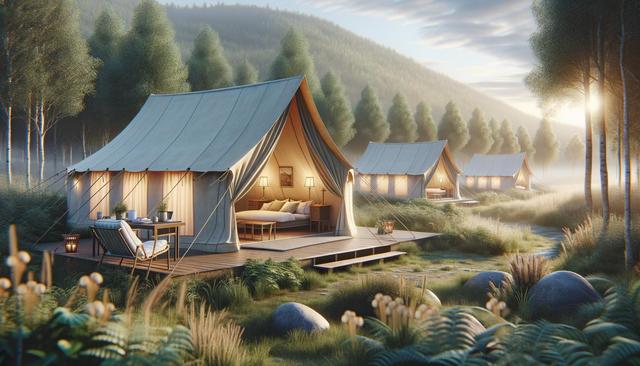A Modern Take on an Ancient Shelter
The concept of living in a tent is far from new. Nomadic cultures have used tents for centuries, and today, tent homes are being reimagined as practical living spaces for those seeking simplicity, mobility, and a closer connection to nature. Unlike traditional camping tents, modern tent homes are designed with durability and comfort in mind. They often feature sturdy frames, weather-resistant materials, and even insulation for year-round use. These structures can range from compact, portable units to larger semi-permanent setups suitable for long-term living.
One of the key appeals of tent homes is their minimal environmental impact. Many designs use sustainable materials and require less energy to heat or cool compared to conventional houses. For environmentally conscious individuals, this can be a meaningful way to reduce their carbon footprint while still enjoying the comforts of home.
Flexibility and Mobility
Tent homes offer a level of flexibility that is difficult to achieve with brick-and-mortar housing. Whether you’re a digital nomad, an outdoor enthusiast, or someone simply looking to downsize, tent living provides a unique opportunity to adapt your home to your lifestyle. They can be set up in remote locations, allowing for off-grid living or seasonal migration depending on climate and personal preference.
Some key advantages of tent homes include:
- Easy relocation without the need for contractors or permits
- Lower cost of setup and maintenance
- Customizable layouts and designs
- Less commitment than purchasing a traditional home
These homes are particularly popular among individuals who value experience over possessions. The ability to pack up and move on short notice aligns well with a lifestyle focused on exploration and adaptability.
Design and Comfort Features
Contrary to what one might expect, tent homes can be quite comfortable. Innovations in design have led to models that feature amenities such as solar panels, composting toilets, and even Wi-Fi connectivity. Interior designs often emphasize open space and multifunctional furniture to make the most of the limited square footage.
Some popular interior features include:
- Insulated walls and roofing for temperature control
- Built-in storage solutions
- Lofts or raised sleeping platforms
- Modular kitchen and bathroom units
These thoughtful designs make tent homes a viable option even in varied climates. With the right setup, tent living can provide a cozy and efficient living environment that doesn’t feel like a compromise.
Cost-Effective Living
For those seeking financial freedom, tent homes present an appealing alternative. The initial investment is typically much lower than purchasing a house or even some RVs. Additionally, ongoing expenses such as utilities, property taxes, and home maintenance are significantly reduced or eliminated.
Cost benefits of tent homes include:
- Affordable initial investment compared to traditional housing
- Lower energy and utility bills
- Minimal maintenance requirements
- Opportunity to live mortgage-free
This affordability makes tent homes an accessible option for students, retirees, and individuals looking to escape the cycle of rent or debt. It also opens up the possibility of investing in land or travel experiences instead of long-term housing costs.
Is Tent Living Right for You?
Adopting a tent home lifestyle isn’t for everyone, but it can be a rewarding choice for those who value freedom, simplicity, and a sustainable way of life. It requires a willingness to adapt and sometimes live with fewer possessions, but the trade-offs can be worthwhile. The tent home movement is as much about mindset as it is about shelter—it reflects a conscious decision to live more intentionally and with less environmental impact.
Before making the leap, it’s essential to consider:
- Local zoning and land-use regulations
- Climate and terrain of your chosen location
- Availability of resources like water and power
- Your tolerance for minimalist living conditions
For those who align with these values and are prepared for the practical aspects of tent living, the experience can be liberating and deeply fulfilling.
Conclusion
Tent homes offer a compelling alternative to conventional housing for those seeking mobility, simplicity, and a closer relationship with nature. With thoughtful design, practical features, and significant cost savings, they cater to a growing audience interested in sustainable and flexible living. Whether used for full-time residence or seasonal retreats, tent homes can provide a unique and rewarding lifestyle for those ready to embrace a different kind of home.




Leave a Reply